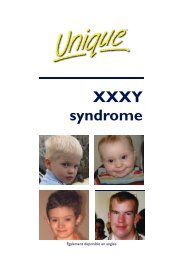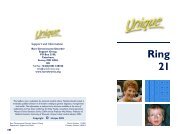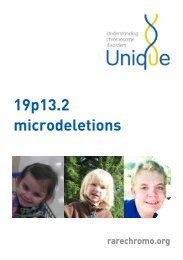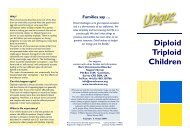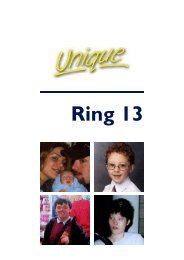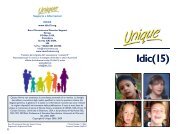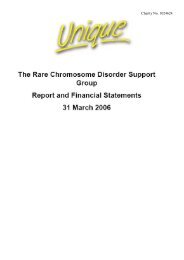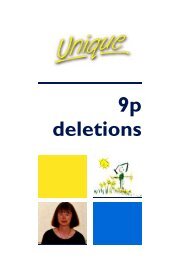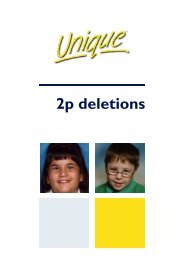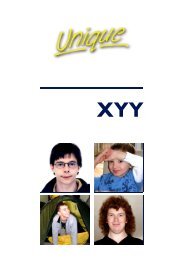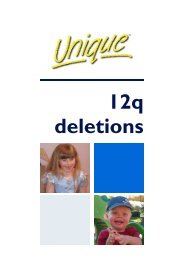16p11.2 microdeletions - Unique - The Rare Chromosome Disorder ...
16p11.2 microdeletions - Unique - The Rare Chromosome Disorder ...
16p11.2 microdeletions - Unique - The Rare Chromosome Disorder ...
Create successful ePaper yourself
Turn your PDF publications into a flip-book with our unique Google optimized e-Paper software.
“ He can brush his hair and teeth but they will need redoing.<br />
He can dress but has no concept of inside out or back<br />
to front - 8 years<br />
“ He wears simple clothing without buttons or zippers and<br />
with Velcro on shoes. He can forget underwear or puts<br />
clothes on the wrong way round - 8½ years<br />
“ No personal care help needed - 9 years<br />
“ He needs help in the shower and bath and with dressing<br />
as he can’t manage buttons or shoe laces - 11 years<br />
“ He’s independent in personal care - 15 years<br />
Toilet training<br />
Toilet training is typically somewhat delayed, with most<br />
<strong>Unique</strong> families reporting children being dry by day by school age and at night by the age<br />
of 10 or 11.<br />
Some learning difficulty<br />
<strong>The</strong>re is a broad spectrum of need for special support with learning. Typically, ability<br />
ranges from normal to a mild delay. Some people have no learning difficulty at all; a few<br />
score in the gifted range in certain areas of learning; within <strong>Unique</strong>, one child has an IQ<br />
score of 135. Others have a specific learning difficulty; perhaps the largest group has a<br />
level of difficulty that would be described as borderline, ‘slow normal’ or mild, with a<br />
tested IQ in the 60-79 range; and others have greater learning challenges ranging from<br />
moderate to severe and need more support.<br />
Information from <strong>Unique</strong> suggests that language-based learning may be specifically<br />
affected with mathematics and art relatively spared. However, this is not true for all, and<br />
some children have advanced language skills.<br />
Some children attend mainstream [regular] school, others attend a speech and language<br />
unit, others attend a school for children with special needs, yet others a unit for children<br />
with an autism spectrum disorder. Depending on local schools, some children start their<br />
education in a mainstream setting, moving to a more supportive learning environment<br />
from the age of 7 or to complete their secondary education (Ghebrianous 2007; Weiss<br />
2008; Bijlsma 2009; Fernandez 2010; Decipher; <strong>Unique</strong>).<br />
“ She learns in her own time with patience, lots of gestures and cuddles and<br />
encouragement. She loves to put things into groups and recognises M for mummy and T<br />
for her own name - 4¼ years<br />
“ His level of learning disability isn’t known yet but he is not near his peers’ level. He<br />
attends a kindergarten and we try to do more at home but he isn’t cooperative. He can<br />
draw faces and cars and enjoys TV, computers, video games, playdoh and to a limited<br />
extent with playing with others - almost 5 years<br />
“ Developmentally he’s around a 3-4 year level and can read simple books but finds<br />
writing especially difficult. He hates to write and colour but can write his own name and<br />
type his own and his sister’s name using a keyboard. He’s following the Handwriting<br />
without Tears programme - 6 years 10 months<br />
9



